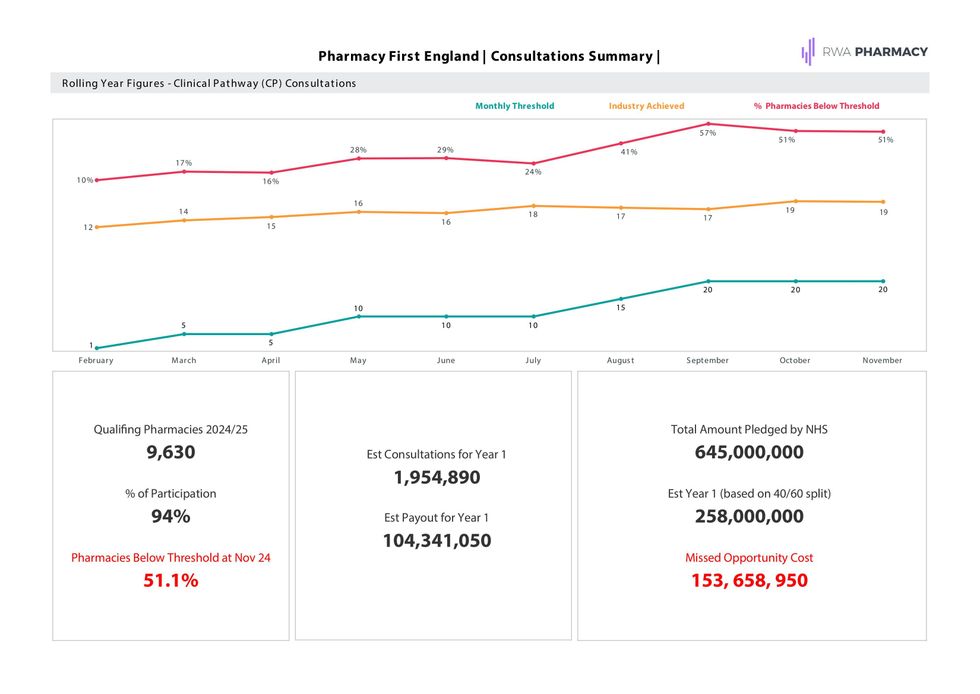By Prof. Harry McQuillan
The announcement of the new Community Pharmacy Contractual Framework (CPCF) for 2025/26 in England marks a step forward in stabilising the community pharmacy network. With an annual funding commitment of £3.073 billion, an increased medicines margin, and improved service fees, the contract presents opportunities for community pharmacies to expand their role in delivering high-quality healthcare. To truly unlock these opportunities, pharmacies have been asked to align with a future service focused model, one that Numark has been advocating for some time through our 12 Principles of Pharmacy Practice.
The allocation of £900 million for medicines margin, a £100 million increase, coupled with a one-off write-off of £193 million in historic margin overspend, represents a significant boost to guaranteed income in pharmacy finances. This aligns with our principle that the supply of medicines remains a core role for community pharmacy. The future of community pharmacy practice will increasingly be a blended approach of supply and service provision, which will need to be managed efficiently with the right support teams and technology, a point I will return to later in this article.
The rise in the Single Activity Fee to £1.46 per item and improved payments for clinical services, such as the Pharmacy Contraception Service and Pharmacy First, reflect a shift toward a more service-led model of community pharmacy.
The increase in fees for Pharmacy First presents a clear opportunity for community pharmacy and further establishes us as the first port of call for patients. Expanding the New Medicine Service to include antidepressants and integrating Emergency Hormonal Contraception (EHC) into the Contraception Service are further steps toward cementing pharmacists' roles in preventative and long-term care. When the free provision of EHC through the community pharmacy network was made in Scotland, two things happened. The first was a shift in care setting as 90% of all EHC provision now goes through that route where previously it was sexual health clinics, A&E and GP prescribing. The second was a demonstrable drop in the level of teenage pregnancies.
One of the key frustrations in pharmacy is the administrative burden that takes valuable time away from patient care. The contract introduces measures to reduce bureaucracy, allowing pharmacies to focus on what they do best – delivering frontline healthcare.
With increasing service demands, must come a smarter approach to workload management. There will be a need for pharmacies to look at more streamlined administrative processes, and further utilising the skills of the pharmacy team.
The role of pharmacy technicians has never been more critical. Maximising the potential of technicians will be a crucial component of future-proofing pharmacy services. By optimising the skill mix within the pharmacy team, pharmacists can release time to focus on patient consultations and prescribing. Numark are calling on the Government to liberalise supervision rules to allow increased dispensing and the provision of vaccination services by pharmacy technicians.
Our recent partnership with Buttercups introduced levy gifting for the Pharmacy Technician Training Programme (PTTP) Apprenticeship, helping pharmacy owners train new pharmacy technicians and build a stronger workforce. Through levy gifting, we’re not only addressing workforce shortages but also making a tangible, positive impact on community pharmacies. The demand for this training was unprecedented and demonstrates the appetite for an upskilled workforce.
The direction of travel for community pharmacy is clear. As clinical service delivery continues to expand, Numark’s 12 Principles of Pharmacy Practice provide a blueprint for success. These principles emphasise integration with primary care, financial sustainability, workforce optimisation, and digital innovation, all essential for thriving in this new contractual framework.
The government’s commitment is a positive signal of support for the sector. The new contract reaffirms the direction Numark has set, and we stand alongside our members ready to provide expert guidance, digital solutions, commercial strategies and advocacy needed to navigate these changes. The future of community pharmacy is full of opportunity, and together, we will ensure that Numark members are at the forefront of this transformation.
Prof. Harry McQuillan is the chairman of Numark UK.









 L-R: Nicola Stockman, Robert Townsend, Atul Patel, and Amerjit Singh
L-R: Nicola Stockman, Robert Townsend, Atul Patel, and Amerjit Singh 






 Harry McQuillan
Harry McQuillan

 Wes Streeting outlines ambitious NHS reform plansPic credit: Getty images
Wes Streeting outlines ambitious NHS reform plansPic credit: Getty images Pharmacies played a critical role during the pandemicPic credit: Hollie Adams/Getty Images
Pharmacies played a critical role during the pandemicPic credit: Hollie Adams/Getty Images


